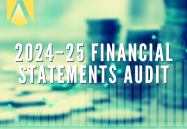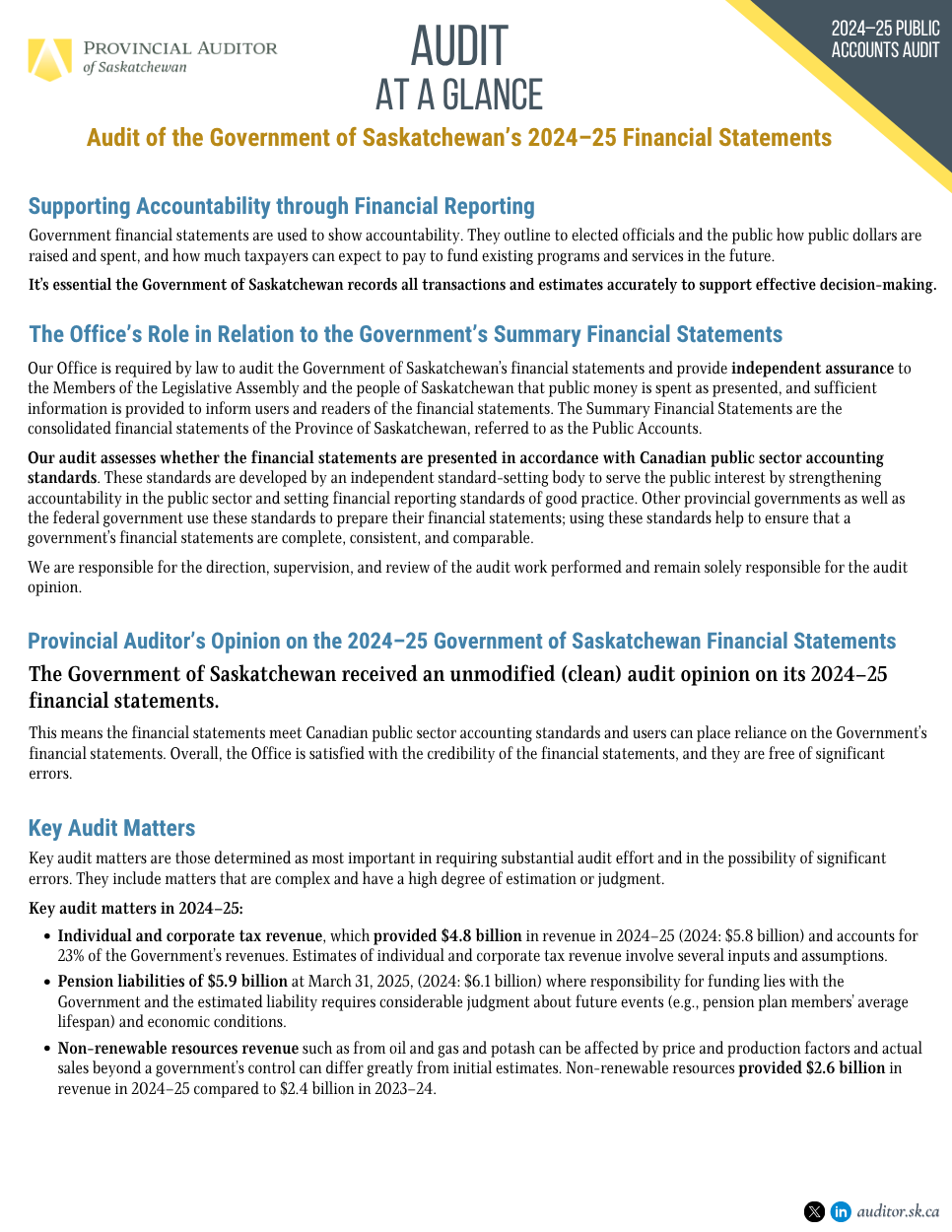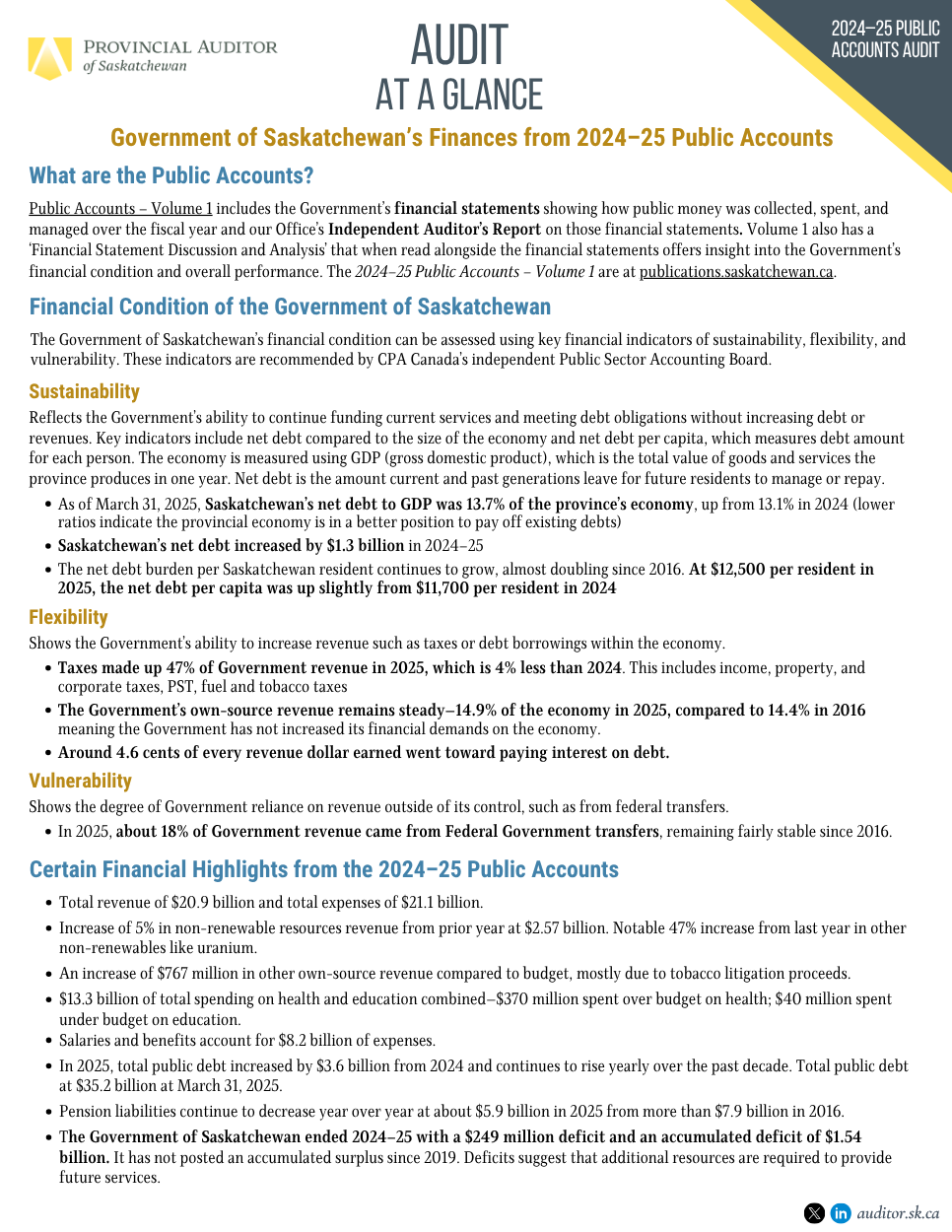Audit of the Government of Saskatchewan’s 2024–25 Financial Statements
 June 27, 2025
June 27, 2025
Government financial statements are used to show accountability, which outlines how public dollars are raised and spent, and how much taxpayers can expect to pay to fund existing programs and services in the future.
It’s essential the Government of Saskatchewan records all transactions and estimates accurately to support effective decision-making.
Provincial Auditor’s Opinion on the 2024–25 Government Financial Statements
The Government received an unmodified (clean) audit opinion on its 2024–25 financial statements.
This means the financial statements meet Canadian public sector accounting standards and users can place reliance on the Government’s financial statements. Overall, the Office is satisfied with the credibility of the financial statements, and they are free of significant errors.
Key Audit Matters
Key audit matters are those determined as most important in requiring substantial audit effort and in the possibility of significant errors. They include matters that are complex and have a high degree of estimation.
Key audit matters in 2024–25:
- Individual and corporate tax revenue, which provided $4.8 billion in revenue in 2024–25 (2024: $5.8 billion) and accounts for 23% of the Government’s revenues. Estimates of individual and corporate tax revenue involve several inputs and assumptions.
- Pension liabilities of $5.9 billion at March 31, 2025, (2024: $6.1 billion) where responsibility for funding lies with the Government and the estimated liability requires considerable judgment about future events (e.g., pension plan members’ average lifespan) and economic conditions.
- Non-renewable resources revenue such as from oil and gas and potash can be affected by price and production factors and actual sales beyond a government’s control can differ greatly from initial estimates. Non-renewable resources provided $2.6 billion in revenue in 2025 compared to $2.4 billion in 2024.
Certain Financial Highlights from the 2024–25 Public Accounts
- Total revenue of $20.9 billion and total expenses of $21.1 billion.
- Salaries and benefits account for $8.2 billion of expenses.
- Increase of 5% in non-renewable resources revenue from prior year at $2.57 billion. Notable 47% increase from last year in other non-renewables like uranium.
- An increase of $767 million in other own-source revenue compared to budget, mostly due to tobacco litigation proceeds.
- $13.3 billion of total spending on health and education combined—$370 million spent over budget on health; $40 million spent under budget on education.
- In 2025, total public debt increased by $3.6 billion from 2024 and continues to rise yearly over the past decade. Total public debt at $35.2 billion at March 31, 2025.
- Pension liabilities continue to decrease year over year at about $5.9 billion in 2025 from more than $7.9 billion in 2016.
- The Government of Saskatchewan ended 2024–25 with a $249 million deficit and an accumulated deficit of $1.54 billion. It has not posted an accumulated surplus since 2019. Deficits suggest that additional resources are required to provide future services.
Audit At A Glance
The Office’s Role in Relation to the Government’s Summary Financial Statements
Our Office is required by law to audit the Government of Saskatchewan’s financial statements and provide independent assurance to the Members of the Legislative Assembly and the people of Saskatchewan that public money is spent as presented, and sufficient information is provided to inform users and readers of the financial statements. The Summary Financial Statements are the consolidated financial statements of the Province of Saskatchewan, referred to as the Public Accounts.
Our audit assesses whether the financial statements are presented in accordance with Canadian public sector accounting standards. These standards are developed by an independent standard-setting body to serve the public interest by strengthening accountability in the public sector and setting financial reporting standards of good practice. Other provincial governments as well as the federal government use these standards to prepare their financial statements; using these standards help to ensure that a government’s financial statements are complete, consistent, and comparable.
We are responsible for the direction, supervision, and review of the audit work performed and remain solely responsible for the audit opinion.




